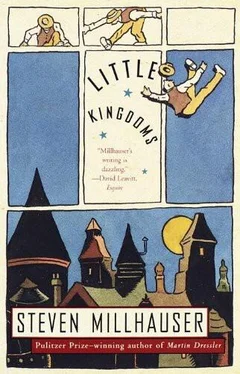• • •
THE TOWER. From dawn to dusk she sits in the tower. We catch glimpses of what appears to be her face in the tower window, but isn’t it likely that we are seeing only flashes of sunlight or shadows of passing birds on the high windowpanes? In all other ways she is invisible, for our solemn poets fix her in words of high, formal praise: her hair is more radiant than the sun, her breasts are whiter than swansdown or new-fallen snow. We saw her once, riding through the market square on a festival day, sitting on her white horse with black ostrich plumes, and we were shocked by the gleam of raven-black hair under the azure hood. But in the long days of midsummer, when the rooftops shimmer in the light of the sun as if they are about to dissolve, her raven hair is gradually replaced by the yellow hair of the poets, until the sight of her astride the white horse seems only a midday dream. High in her tower, from dawn to dark she paces in her grief, and who can say whether even her sorrow is her own?
LEGENDS OF THE RIVER. The river breeds its own stories, which we hear as children and never forget: the fisherman and the mermaid, the king in the hill, the maid of the rock. As adults we recall these legends fondly, even wistfully, for we no longer believe in them as we once did, but not every tale of the river passes into the realm of cherished, harmless things. Such is the tale of the escape of the prisoner: the splash, the waiting boat, the voyage, and there, already visible in the distance, the flames consuming the town and the castle, the blackness of the sky, the redness of the river.
INFELIX. The Princess, who had been startled by the Prince as she gazed out the window in the recess of her private chamber, gave the incident no further thought. Instead she continued to think of the margrave’s story, which he had revealed to her one day while they were walking in the garden, and about which she had been brooding when the Prince interrupted her revery. The margrave had told how his younger brother, secretly lusting after the margrave’s bride, had stolen the girl and locked her in a tower guarded by forty knights. Upon learning that the margrave was raising an army to free his bride, the brother sent him a jeweled casket; when the margrave opened the casket he saw the severed head of his bride. Half-crazed with grief and fury, the margrave led his knights against his brother, at last slaying him with his sword, cutting off his head, and razing the castle. But the margrave could not rest. Haunted by his dead bride, unable to bear his empty life, he fled from that accursed country, seeking adventure and death — death, which disdained him — and coming at last to the castle of the Prince. The Princess, pained by the margrave’s tale, did not try to console him; and now each day, when the Princess dismissed her ladies, the margrave spoke to her of his slain bride, whom he had loved ardently; for though he had vowed never to speak of her, yet speaking eased his heart a little.
THE TOWN. Our town lies on the lower slope of a hill that goes down to the river. The town extends from the bank of the river to a point partway up the hill where the slope becomes steeper and the vineyards begin. Above the vineyards is a thick wood, which lies within our territorial domain and harbors in its darkness a scattering of sandstone quarries, charcoal kilns, clearings yellow with rye, and ovens for manufacturing glass. Except for the grist mills, the sawmills, the copper mill, and the bathhouse, which stand on the bank of the river, our town is entirely enclosed by two meandering walls: an outer wall, which is twenty feet high and eight feet thick, with towers that rise ten feet higher than the battlements, and a vast inner wall, which is forty feet high and twelve feet thick, with towers that rise fifteen feet higher than the battlements. Between the two walls lies a broad trench covered with grass, where deer graze and where we hold crossbow matches and running contests. Should an enemy penetrate the defenses of the outer wall, he must face the defenses of the towering inner wall, while standing in the trench as at the bottom of a trap, where we rain upon him arrows and gunshot, rocks large enough to crush a horse, rivers of molten lead. Flush against the outer wall stands a dry moat, broad and very deep, which an enemy must cross in order to reach our outermost defenses. Although we have enjoyed peace for many years, guards patrol both walls ceaselessly. Inside the walls, steep-gabled houses with roofs of red tile line the winding stone-paved streets, carts rumble in the market square, fruit sellers cry from their stalls, from the shops of the ironworkers and the coppersmiths comes a continual din of hammers, servants hurry back and forth in the courtyards of the patricians’ houses, in the shade of the buttresses of the Church of St. Margaret a beggar watches a pig lie down in the sun.
THE PEAR TREE. The Princess was quick to sense a change in the Prince, who looked at her strangely, often seemed on the verge of saying something, and lay restlessly beside her at night. She waited for him to unburden himself, but when he continued to keep his mind in shadow, she determined to speak. One morning when she and the Prince were walking in the walled garden, where she had lately walked with the margrave, the Prince stopped beside a pear tree to pick a piece of fruit. With a melancholy smile he handed the yellow pear to his wife. The Princess took the pear and thanked him, but said that she would like to share it with her lord, reminding him that she was not only his wife, but his dearest friend, who asked no higher pleasure than to share his joys and sorrows, and to ease the burdens of his heart. The Prince, who wished only to conceal the ignoble secret of his suspicion, felt a motion of irritation toward his wife, who by her words had put him in the position of having to deceive her, and he replied coldly that he had picked the pear not for himself, but for her alone; and turning his face away he added that he had cause to believe that his new friend, who was also her friend, had dishonest intentions toward him. The Princess, though hurt by his cold refusal of the pear, was nonetheless pleased that he had unburdened himself at last. She replied that she knew not who had been trying to divide the Prince from his friend, but for her part, she could assure her lord that the margrave was as trustworthy as he was honest, and as loyal as he was trustworthy, and that he was entirely devoted to the Prince and to all that concerned him. The Prince, ashamed of his suspicion, convinced of his wife’s honor, yet hearing in her words a disturbing ardor, repeated sternly that he had cause to doubt the stranger, and wished to request of the Princess a small service. Though stung by his tone, the Princess put herself instantly at his disposal. Plucking a second pear roughly from the tree, the Prince asked the Princess to test the admirable devotion of his friend by offering to him what was most dear to the Prince in all the world. To put matters plainly, he desired the Princess to go to the margrave in his bedchamber that night, to lie down beside him, and to report the outcome to the Prince the next morning. In that way, and in that way alone, he hoped to be able to dispel the doubt that had arisen in his mind. The Princess, who all this while had been holding the first pear in her hand, looked at the Prince as if she had been struck in the face. The Prince watched the yellow pear fall from her long fingers and strike the ground, where it rolled over and revealed its split skin. Her look, like that of someone frightened in the dark, made the prince taste the full horror of his moral fall, even as it sharpened the sting of his suspicion.
• • •
PATRICIANS. The patricians of our town are powerful men with broad shoulders, keen eyes, and a touch of disdain about the lips. In their steep-gabled houses with arcaded ground floors and three upper stories, furnished well but without ostentation, one sees handsome door panels, table centerpieces of chased silver, and heavy paintings of themselves and their wives: the patricians in their broad berets and their dark robes trimmed with fur, the wives in plain bodices with velvet-trimmed sleeves. From their paintings the patricians stare out fearless as princes. Indeed, in times of danger they leave their counting houses and their seats in the Council Chamber, put on sturdy armor forged by our master armorers, mount their proud horses, and lead well-armed citizens in maneuver and battle. The patricians are wealthier and more powerful than the nobles of the castle, against whom they have relentlessly asserted their rights as free citizens, thereby further weakening the always declining power of the Prince. And yet these keen-eyed merchants, in the pauses of their day, will raise their heads for a moment, as if lost in thought; or striding along the slope of an upper street, suddenly they will stare out between the walls of two houses at the river below, the sunny cliff, the high castle. Some of our patricians purchase for their wives cloaks modeled after the cloaks of court ladies, and hang on their walls ceremonial swords with jeweled hilts. We who are neither nobles nor patricians, we who are of the town but watchful, observe these manifestations without surprise.
Читать дальше












